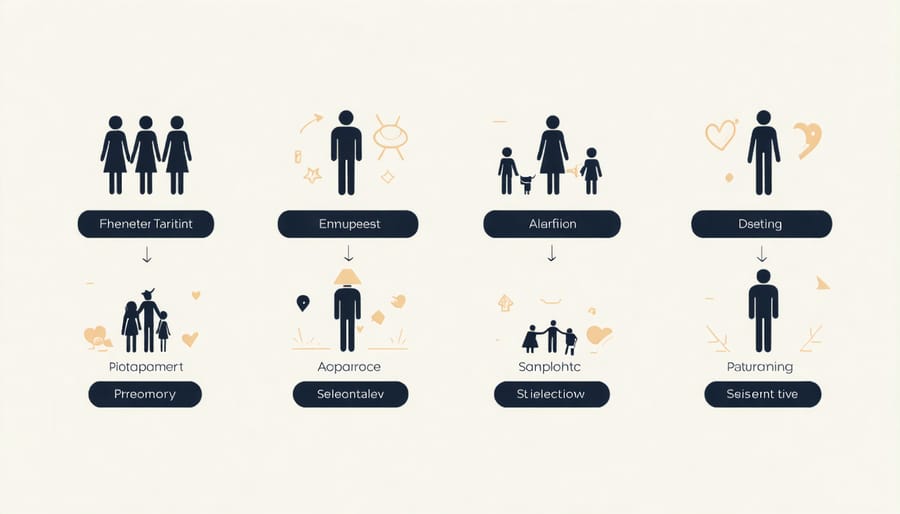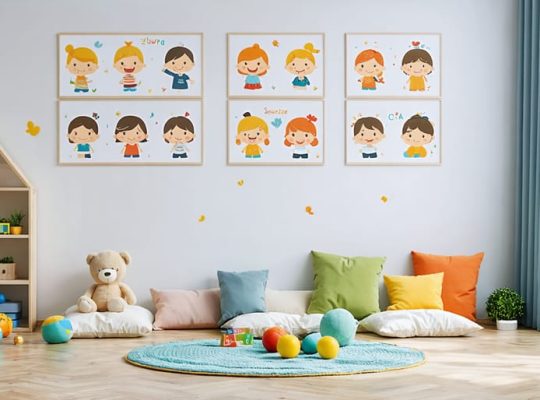The way we parent shapes our children’s emotional landscape far beyond their childhood years. Recent research reveals that parenting styles can either fortify or fragment a child’s mental well-being, creating ripples that extend into their adult lives. As parents navigate the complex journey of raising mentally healthy children, understanding the delicate interplay between parenting approaches and psychological development becomes crucial.
Studies consistently show that authoritative parenting – characterized by warmth, clear boundaries, and open communication – correlates strongly with better mental health outcomes in children. Children raised in such environments typically display higher self-esteem, stronger emotional regulation, and greater resilience when facing life’s challenges. Conversely, highly controlling or overly permissive parenting styles can contribute to anxiety, depression, and behavioral issues.
Yet, the relationship between parenting and mental health isn’t just about choosing the “right” style – it’s about creating an environment where both parents and children can thrive emotionally. Modern parents face unique challenges in this digital age, balancing traditional wisdom with contemporary insights about child development and mental wellness. This understanding empowers families to adapt their parenting approaches thoughtfully, fostering psychological well-being across generations.
Understanding Different Parenting Styles

Authoritative Parenting
Authoritative parenting strikes a healthy balance between setting clear boundaries and providing emotional support. Parents who adopt this style communicate expectations clearly while remaining responsive to their children’s emotional needs. They explain the reasoning behind rules and consequences, fostering understanding rather than blind obedience. Children raised in authoritative households often develop strong self-esteem, emotional regulation skills, and resilience.
Dr. Sarah Chen, a child psychologist, notes: “These children typically feel secure expressing their feelings because they know their parents will listen and respond with empathy.” This parenting approach encourages independence while maintaining a supportive family structure. Children learn to make decisions within safe boundaries, developing crucial problem-solving skills and emotional intelligence that benefit their long-term mental health.
Remember, being authoritative doesn’t mean being perfect – it’s about consistently combining warmth with appropriate structure.
Authoritarian Parenting
Authoritarian parenting is characterized by high expectations and strict rules with limited emotional warmth or flexibility. Parents using this style often enforce compliance through punishment rather than discussion, leaving little room for children’s input or independence. While structure can provide stability, the lack of emotional nurturing may impact a child’s mental well-being. Children raised in authoritarian households might struggle with self-esteem, show increased anxiety, or have difficulty making independent decisions. They may excel academically but often experience challenges in social situations and emotional expression. Research suggests these children might develop a fear of failure and perfectionist tendencies, potentially carrying these patterns into adulthood. Understanding these impacts helps parents recognize when they might need to balance discipline with more emotional support and open communication.
Permissive Parenting
Permissive parenting is characterized by high warmth and responsiveness but minimal rules and boundaries. Parents using this style often take on more of a friendship role with their children, avoiding confrontation and rarely enforcing consequences for misbehavior. While these parents are loving and emotionally supportive, the lack of structure can impact a child’s emotional development.
Children raised in permissive households may struggle with self-regulation and impulse control. Without clear boundaries, they might find it challenging to develop internal discipline and cope with disappointment. Research suggests these children may be more likely to experience anxiety and show difficulty adapting to structured environments like school.
However, the high level of emotional support in permissive parenting can foster creativity and independence. The key is finding a balance between maintaining loving relationships and establishing necessary boundaries for healthy development.
Neglectful Parenting
Neglectful parenting, also known as uninvolved parenting, is characterized by minimal emotional and practical involvement in a child’s life. Parents may provide basic necessities but remain largely disconnected from their child’s emotional needs, activities, and daily experiences. This can stem from various factors, including personal struggles, mental health issues, or substance abuse problems.
Children raised in neglectful environments often develop significant emotional and behavioral challenges. They may struggle with low self-esteem, difficulty forming healthy relationships, and problems regulating their emotions. These children frequently feel unsupported and may have trouble seeking help when needed.
It’s important to note that if you recognize these patterns in your parenting, support is available. Professional counseling, parenting classes, and community resources can help you develop more engaged parenting skills and strengthen your connection with your child. Small steps toward increasing involvement can make a meaningful difference in your child’s well-being.
How Parenting Styles Impact Mental Health

Emotional Development
The way parents interact with their children profoundly shapes their emotional development. Research shows that different parenting styles can significantly influence a child’s ability to develop healthy emotional regulation skills and their overall impact on self-esteem.
Children raised by authoritative parents typically develop stronger emotional awareness and coping strategies. These parents create a supportive environment where feelings are acknowledged and discussed openly, helping children understand and manage their emotions effectively. As Dr. Sarah Chen, a child psychologist, notes, “When children feel heard and supported, they’re more likely to develop confidence in handling emotional challenges.”
In contrast, children of authoritarian parents might struggle with expressing emotions and may develop anxiety about making mistakes. Those with permissive parents might have difficulty managing frustration and setting emotional boundaries. Meanwhile, children of neglectful parents often face challenges in building emotional resilience and maintaining healthy relationships.
Creating a balanced emotional environment involves consistent support, clear boundaries, and open communication. Simple practices like validating feelings, modeling healthy emotional expression, and maintaining predictable routines can significantly enhance your child’s emotional development. Remember, it’s never too late to adjust your parenting approach to better support your child’s emotional growth.
Social Skills
The way we parent significantly influences how our children develop social skills and form relationships throughout their lives. Research shows that children raised by authoritative parents typically demonstrate stronger social competencies, forming healthier friendships and maintaining better relationships with peers and adults alike.
Dr. Sarah Chen, a child development specialist, notes, “Children from authoritative households learn to express themselves confidently while respecting others’ boundaries. They develop emotional intelligence that serves them well in social situations.”
In contrast, children raised in authoritarian households may struggle with social interactions, often showing either excessive shyness or aggressive tendencies. They might find it challenging to express their feelings openly or navigate conflicts constructively. Those from permissive households sometimes face difficulties with impulse control and understanding social boundaries.
The good news is that adaptive social skills can be cultivated through conscious parenting choices. Creating opportunities for supervised social interactions, modeling healthy relationship behaviors, and encouraging open communication can help children develop strong social foundations.
Maria Rodriguez, a mother of three, shares, “When we switched from a strict parenting approach to a more balanced one, we noticed our children became more confident in social situations. They started making friends more easily and handling conflicts better.”
Remember, supporting your child’s social development isn’t about forcing interactions but rather creating a secure base from which they can explore relationships confidently.
Anxiety and Depression Risk
Research consistently shows that parenting styles can significantly influence a child’s risk of developing anxiety and depression. Children raised in authoritarian households, where strict rules and harsh punishment are common, often experience higher levels of anxiety and may struggle with self-esteem issues. The constant pressure to meet rigid expectations can create a persistent state of stress, potentially leading to anxiety disorders later in life.
Similarly, children of permissive parents might face different challenges. Without consistent boundaries and guidance, they may develop difficulties in managing emotions and coping with life’s challenges, potentially increasing their vulnerability to depression. The lack of structure can leave them feeling insecure and overwhelmed when facing important decisions or setbacks.
On the other hand, children raised with an authoritative parenting style typically show lower rates of anxiety and depression. This approach, which balances clear expectations with emotional support and open communication, helps children develop resilience and healthy coping mechanisms. They learn to express their feelings safely and develop strong problem-solving skills, which serve as protective factors against mental health challenges.
Dr. Sarah Martinez, a child psychologist, notes, “The key is creating an environment where children feel both secure and heard. When parents combine reasonable boundaries with emotional availability, they help build their child’s psychological well-being.”
Remember that it’s never too late to adjust your parenting approach. Small, consistent changes in how you interact with your child can make a significant difference in their mental health outcomes.
Creating a Healthy Parenting Approach

Building Emotional Connection
Building a strong emotional connection with your child is fundamental to their mental well-being and creates a foundation for lifelong resilience. Start by practicing active listening – put away distractions, maintain eye contact, and show genuine interest in your child’s thoughts and feelings. Simple responses like “Tell me more about that” can encourage open communication and make your child feel valued.
Create daily opportunities for connection through quality time. This could be reading together before bedtime, sharing meals without screens, or engaging in activities your child enjoys. Even brief moments of undivided attention can strengthen your bond significantly.
Remember to validate your child’s emotions, even when they’re difficult. Instead of dismissing feelings with phrases like “Don’t cry” or “It’s not a big deal,” try acknowledging their experience: “I can see why that made you sad” or “That sounds really frustrating.”
Physical affection, when comfortable for your child, can also boost emotional connection. Hugs, gentle pats on the back, or sitting close while talking release oxytocin, which promotes bonding and reduces stress.
Dr. Sarah Chen, child psychologist, notes: “Children who feel emotionally connected to their parents are more likely to develop healthy coping mechanisms and maintain better mental health throughout their lives.”
Make it a priority to celebrate your child’s successes, no matter how small, and be present during challenging times. This consistent emotional support helps build trust and security in your relationship.
Setting Healthy Boundaries
Setting healthy boundaries is crucial for both parent and child well-being. Dr. Sarah Chen, a child psychologist, explains, “Boundaries create a sense of security and help children understand their world better.” When establishing rules and limits, consistency and clarity are key elements for success.
Start by identifying your non-negotiable values and safety concerns. These form the foundation of your boundary-setting framework. Communicate expectations clearly and at an age-appropriate level, ensuring your child understands both the rules and their reasoning.
Remember to involve your children in the boundary-setting process when appropriate. For instance, while bedtime might be non-negotiable, they could help choose their bedtime routine activities. This collaborative approach helps children feel respected and more likely to cooperate.
Consider these practical guidelines:
– Set clear consequences and follow through consistently
– Use positive language to frame boundaries
– Acknowledge and validate feelings while maintaining limits
– Adjust boundaries as your child grows and develops
– Model respect for others’ boundaries
Maria Torres, a parent educator, shares, “The most effective boundaries are those that provide structure while allowing room for growth and learning from mistakes.” Remember that it’s okay to revisit and adjust boundaries as needed – flexibility within reason shows your child that you’re responsive to their developing needs while maintaining necessary structure.
Focus on creating boundaries that protect and nurture rather than restrict and control. This balanced approach supports healthy emotional development and strengthens the parent-child relationship.
Supporting Mental Wellness
Supporting your child’s mental wellness begins with creating a safe, nurturing environment where they feel heard and valued. Start by establishing regular check-ins with your child, setting aside dedicated time each day to talk about their feelings, experiences, and concerns without judgment.
Practice active listening by maintaining eye contact, acknowledging their emotions, and avoiding the urge to immediately solve their problems. Sometimes, children just need someone to understand and validate their feelings. Remember that every child processes emotions differently, and what works for one may not work for another.
Encourage healthy coping mechanisms like deep breathing exercises, creative expression through art or music, and physical activity. These tools can help children manage stress and anxiety in constructive ways. Create predictable routines and boundaries while remaining flexible enough to adapt to your child’s changing needs.
Model good mental health practices yourself. Children learn by example, so demonstrate healthy emotional expression, self-care, and stress management. Don’t hesitate to seek professional help when needed – this shows your child that it’s okay to ask for support.
Build your child’s resilience by celebrating their efforts rather than just outcomes, helping them learn from mistakes, and fostering problem-solving skills. Remember that supporting mental wellness is an ongoing journey that requires patience, consistency, and compassion – both for your child and yourself.
As we’ve explored throughout this article, the relationship between parenting styles and children’s mental health is both profound and complex. The good news is that awareness and willingness to adapt our parenting approaches can make a significant positive difference in our children’s emotional well-being.
Remember that no parent is perfect, and every family’s journey is unique. The key is to strive for a balanced approach that combines warmth and structure, while remaining responsive to your child’s individual needs. By fostering open communication, setting appropriate boundaries, and showing consistent love and support, you can create an environment that promotes positive mental health outcomes.
Consider starting with small, manageable changes in your parenting approach. This might mean dedicating more one-on-one time with your child, practicing active listening, or working on expressing emotions in healthy ways together. Even minor adjustments can lead to meaningful improvements in your child’s emotional resilience and well-being.
If you’re struggling with parenting challenges, remember that seeking support is a sign of strength, not weakness. Whether through parenting groups, professional counseling, or trusted family members, there are many resources available to help you develop and maintain a positive parenting style that benefits both you and your child.
By prioritizing both your child’s emotional needs and your growth as a parent, you’re investing in a healthier, happier future for your family.







